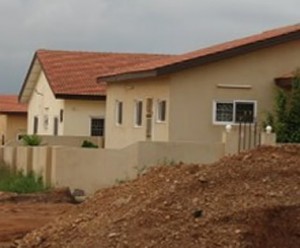The matter of ‘security deposit’ in renting a home in Ghana
 Renting a home in Ghana these days has become extreme sport. Not only are the costs of rent hitting the roof, finding housing at convenient locations, such as close to the workplace has become difficult. With the housing deficit in Ghana above two million and inequality widening, it’s getting harder for most people to find convenient housing – forcing many people to live in below standard facilities such as slums and kiosks. Some 40 per cent of citizens live in slums and another 20 per cent lives in kiosks. Not sure how many people are homeless as a result.
Renting a home in Ghana these days has become extreme sport. Not only are the costs of rent hitting the roof, finding housing at convenient locations, such as close to the workplace has become difficult. With the housing deficit in Ghana above two million and inequality widening, it’s getting harder for most people to find convenient housing – forcing many people to live in below standard facilities such as slums and kiosks. Some 40 per cent of citizens live in slums and another 20 per cent lives in kiosks. Not sure how many people are homeless as a result.
In addition to all that have become part of the housing conundrum in Ghana these days, is the introduction of the concept of ‘security deposit’.
When you are renting a home in Ghana these days, landlords would ask for ‘security deposit’. That concept is new to Ghana’s rent market but has become entrenched. It is common in the US, for instance, where it is also not backed by law, but allowed. In some states, for instance in New York, the landlord is required to put the ‘deposit’ in a separate interest accruing account in the name of the tenant.
The idea behind the ‘security deposit’ is that it serves as an insurance against damages in the facility when the tenant is leaving. Before the tenant hands over the keys, the building is assessed, and if there are no damages, the ‘deposit’ with the accrued interest is refunded to the tenant, but if there are damages, that is also assessed and estimated and as a result, the tenant may lose some or all of their ‘deposit’, depending on the cost for repairs. In the US also, rent is paid monthly, and the ‘security deposit’ is mostly set at equivalent to one month rent.
In Ghana, however, contrary to the Rent Law, landlords and ladies demand rent for a year, and in some cases two or three years. The rent law is clear about advance payment for rent. It is an offence to demand rent advance in excess of six months, but it is not known if any landlord or lady has ever been prosecuted for that.
The Rent Act, 1963 (Act 220) Part vii—Offences, etc. Section 25 (5) states:
“Any person who as a condition of the grant, renewal or continuance of a tenancy demands in the case of a monthly or shorter tenancy, the payment in advance of more than a month’s rent or in the case of a tenancy exceeding six months, the payment in advance of more than six months rent shall be guilty of an offence and shall upon conviction by the appropriate Rent Magistrate be liable to a fine not exceeding one hundred pounds.”
 While homeowners in Ghana take rent advance for more than six months, some even demand more than 500 per cent of the rent as ‘security deposit’. For instance, for a rent less than GH¢1000 a month, a landlord somewhere was demanding GH¢5000 as ‘security deposit’.
While homeowners in Ghana take rent advance for more than six months, some even demand more than 500 per cent of the rent as ‘security deposit’. For instance, for a rent less than GH¢1000 a month, a landlord somewhere was demanding GH¢5000 as ‘security deposit’.
Some landlords have also made it a habit to demand a ‘security deposit’ every year!
It is not clear when the idea of ‘security deposit’ was introduced in Ghana, but landlords have made a good case for it. They argue that in some cases, some tenants after their tenancies have left their facilities in worse states than they met them, and they demand the ‘deposit’ as insurance against such damages.
Not only individual landlords are taking ‘security deposit’, even real estate companies, that rent out facilities are doing so.
While the argument for a ‘security deposit’ has some merit, without any doubt, the housing industry in Ghana is chaotic and looks very much unregulated, even though there is a law for renting.
The housing situation in Ghana is almost a pandemic, leaving room for individuals to do as they want. But considering the disinterest of governments over time to address the situation strategically and on purpose, it would only get worse.
By Emmanuel K. Dogbevi
Copyright ©2022 by NewsBridge Africa
All rights reserved. This article or any portion thereof may not be reproduced or used in any manner whatsoever without the express written permission of the publisher except for the use of brief quotations in reviews.
